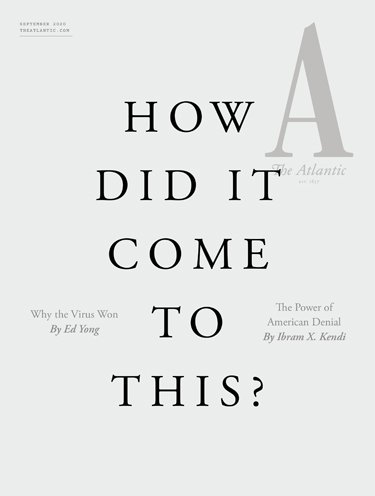Commentary’s Christine Rosen finds puzzling the Atlantic’s current obsessive dooming-and-glooming. Why is the American Establishment wallowing in self pity all the time?
The Atlantic is one of the most prestigious magazines in the nation—and almost certainly its most lavishly funded. When Laurene Powell Jobs (whose net worth is approximately $22 billion) bought former owner David Bradley’s stake in the magazine in 2017, she ushered in an era of almost unimaginable expansion for a publication created before the Civil War. Under its editor, Jeffrey Goldberg, the Atlantic has added 100 new staff jobs. The once-staid monthly is now a round-the-clock Web content provider that releases dozens of new items a day.
The Atlantic’s prominence and seriousness—and the bottomless pockets of its multibillionaire owner—have made it a dream come true for literally hundreds of liberal American journalists who spent most of the past 20 years in a panic about the financial viability of their chosen profession. So why is the Atlantic an emotional train wreck of a publication? If the New Yorker’s annual cover model, the monocle-bearing dandy Eustace Tilley, is supposedly its personification, the Atlantic’s should be Munch’s Scream. …
The Atlantic reader who visits the website rather than simply journeying there through social-media links is turned into a doom-scroller, confronted time and again as she journeys down the homepage with headlines like this one: “America Is Running Out of Time.” Note how the title lacks specificity; it doesn’t need specificity, because this is what nearly every article in the Atlantic is about. (A recent feature in the January/February print issue of the magazine was titled, simply, “Are We Doomed?”)
“Bring Back the Nervous Breakdown,” urged a 2021 article. And so Goldberg’s Atlantic has. An astonishingly large number of stories in both the print and online versions of the magazine now focus on the irrational feelings of a very particular and privileged class of people—elite, left-of-center, educated people who ironically believe themselves too sophisticated to be emotionally manipulated like the unwashed Fox-viewing masses they abhor.
Pieces like Ian Bogost’s essay “I’m Starting to Give Up on Post-Pandemic Life” typify the Atlantic’s panic porn—the titillating personal account of a distorted negative emotional experience described lubriciously with no observable larger social purpose. “Even if this strain is less bad than it might have been,” he writes of the Omicron variant, “only dumb luck will have made it so. That’s neither victory nor a sign that the emergency is over.” He then spirals into despair: “The coronavirus was once ‘novel’ because it was new. Now it feels both ancient and eternal. Having endured the emergence of two major strains even since the rollout of vaccines, a difficult thought is planted in my head: What if the pandemic never ends?”
This Eeyore-meets-Nietzsche tone now dominates much of the magazine’s coverage.






A. Squaretail
Interesting article. One thing though. The Atlantic isn’t “one of the most prestigious magazines in the nation.” Not even close. It once was. Many year ago. Decades ago. No one on either side of the political divide takes it seriously these days. It’s the CNN of magazines and deteriorating even more rapidly. Its owner would be embarrassed if it were possible for Democrats and “progressives” to be embarrassed. Had she any intellectual capacity and honor, she would put the Atlantic out of its misery. Now. Immediately.
Hairless Joe
Back when I used to comment on the Althouse blog (under another name) I noticed this pattern. She seemed to find these self-absorbed neurotics and their miserable obsessions endlessly fascinating. (The Atlantic, and the “human interest” articles in the NYT were major sources for her posts.) I could never understand this, because the whole mindset seems very juvenile and tiresome to me. The solution to their ennui was and is simple: Get actively involved in your own life and passions, do something unselfish for another human being, stop thinking about your precious sensitive self all the time. Apparently this is too harsh a cure for the comfortably afflicted writers and their smugly ironic audience.
Jim B
Before Michael Kelly left us, the magazine had moments of groundbreaking thought. Afterwards, nothing but twaddle.
Please Leave a Comment!